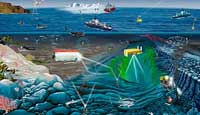 Partnership for Observation of the Global Oceans
Partnership for Observation of the Global Oceans
Plymouth, UK
1-Oct-2010
‘It is past time to get serious about measuring what’s happening to the seas around us’
The ocean surface is 30 percent more acidic today than it was in 1800, much of that increase occurring in the last 50 years – a rising trend that could both harm coral reefs and profoundly impact tiny shelled plankton at the base of the ocean food web, scientists warn. Despite the seriousness of such changes to the ocean, however, the world has yet to deploy a complete suite of available tools to monitor rising acidification and other ocean conditions that have a fundamental impact on life throughout the planet.
Marine life patterns, water temperature, sea level, and polar ice cover join acidity and other variables in a list of ocean characteristics that can and should be tracked continuously through the expanded deployment of existing technologies in a permanent, integrated global monitoring system, scientists say.
The Partnership for Observation of the Global Oceans (POGO), representing 38 major oceanographic institutions from 21 countries and leading a global consortium called Oceans United, will urge government officials and ministers meeting in Beijing Nov. 3-5 to help complete an integrated global ocean observation system by target date 2015.
Full news release, click here
Media coverage summary, click here
Coverage by Reuters: click here